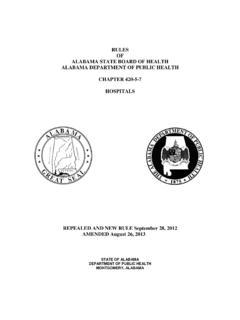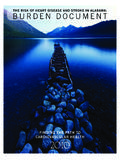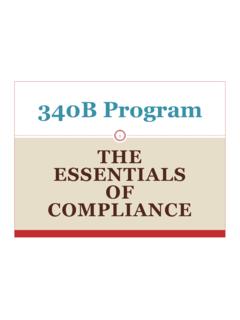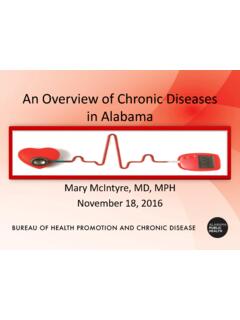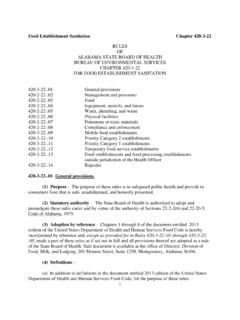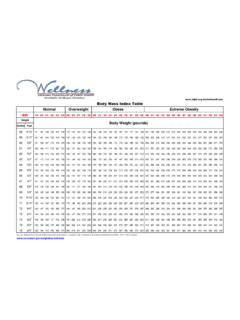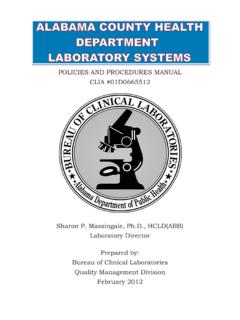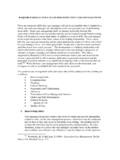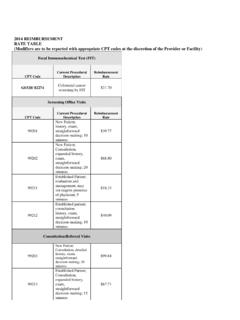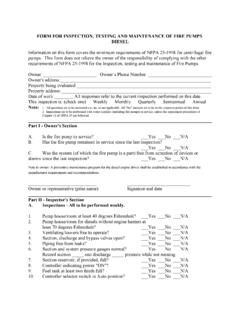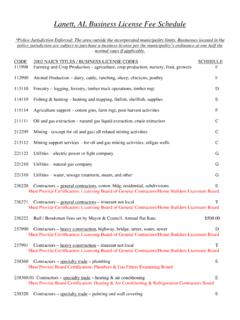Transcription of General Information on Operating Concessions in Alabama
1 General Information on Operating Concessions in Alabama This Information has been developed to help concessionaires set up and run food operations in a sanitary and healthful manner and to minimize the risk of foodborne illness. To avoid problems, concessionaires are encouraged to contact the county health department where the event will be held as early as possible when planning a food booth. An Environmentalist will be pleased to help you with your plans. He/she will point out the steps that must be taken to help ensure a sanitary operation that will protect the public from foodborne illness. These are standard requirements and recommendations, the County Environmentalist may have specific additional requirements depending on the food to be prepared and served, the General location of the event or food concession area, the availability of city water and sewage, and other local considerations. PERMITS REQUIRED.
2 Individuals or groups planning to hold events that are open to the public must have a permit. The Rules of the State Board of Health require that a permit to operate a temporary food booth be obtained prior to any food being sold. Each concession must have its own permit. If you advertise the event with flyers, banners, newspaper articles, or by any other means, it is considered a public event. A valid permit shall be conspicuously posted in every temporary food service establishment. This helps ensure that the food sold will be as safe as possible. Many outbreaks of foodborne illness have been traced back to food improperly handled at temporary events. APPLICATION FOR A PERMIT. The application form may be obtained from the County Health Department. Individuals should submit an application in order for the Health Department to review the proposed food service techniques. The Health Department's Environmentalist will work with you to review the following steps: The types of foods to be prepared How they will be prepared The methods used to keep foods hot and cold Source of foods He/she may also suggest techniques that will enable your booth to operate more efficiently and safely.
3 It is recommended that the application be returned a minimum of 3 weeks before the event. This allows time for the Health Department staff to adequately review the procedures and to make any changes necessary well in advance of the event. WHAT ARE THE REQUIREMENTS TO OPERATE? (1.) Application for a permit - Fill out an application at least 3 weeks before the event. Permit approval and fees are required before operations begin. (2.) Inspections - Food booth operators may be required to make an appointment for a pre-opening inspection prior to the first day of the event. Selling is not allowed to begin before the permit is issued. Inspections may be conducted frequently during operation. (3.) All food preparation must be done in an approved kitchen facility, or a properly equipped and approved booth or mobile unit. Approved means permitted by the Health Department. Keep foods protected and at safe hot or cold temperatures (135F or hotter, or 41F or colder) during storage and transportation.
4 (4.) Source of foods - To minimize the risk of food-borne illness, home-prepared and home-canned foods, ice made at home, raw (unpasteurized) milk, or storage of foods at private homes are not allowed. Meats brought in to use must be USDA inspected and have original label or the invoice where purchased. (5.) Cooking - All cooking of foods must be done towards the back or the booth. When barbequing or using a grill, the equipment must be separated (roped off) from the public. Adequate protection from flies and other insects is required. Screening, mesh flaps, or fly fans are acceptable if effective. Overhead protection is required for food handling areas. Tents and other materials should be fire retardant. (6.) Cold holding - Proper refrigeration or cold storage facilities are required for cold, potentially hazardous foods. Mechanical refrigeration is requested; however, in case of possible power outages, it is advisable to have a backup method such as insulated containers and ice from an approved source (that is, clean store bought ice, or ice from an approved facility).
5 Storage of prepacked food in contact with water or undrained ice is prohibited. Wrapped foods such as sandwiches shall not be stored in direct contact with ice. Ice for consumption must be separated from ice used for storage and kept in a food grade container. (7.) Reheating - Crock pots, steam tables, or other hot holding devices are not to be used as a means of heating up foods; they are to be used only for hot holding purposes. We recommend that reheated foods be done on the grill or on a propane stove to bring the food temperature to at least 165F within 30 minutes. Crock pots, steam tables, or other hot holding devices are slow cooking, and may allow the rapid multiplication of bacteria that cause food poisoning. All cooking equipment shall be of approved design and properly installed to meet local fire and safety codes. Equipment such as deep fat fryers must be set on a stable surface. (8.) Hot holding - For hot holding, electrical equipment is recommended.
6 However, other methods, such as propane stoves, grills or other equipment capable of holding food at 135F and above may be used, and should be available for backup. Canned heat is allowed, if it maintains proper temperatures. (9.) A metal-stem thermometer must be available and used to check internal food temperatures. Thermometers may be purchased from restaurant supply companies or from large variety stores. They must be able to measure from 0 to 220F. (10.) Leftovers may not be sold, served, or used in the booth. Hot foods which have not been used by the end of the day must be discarded. (11.) Hand-washing facilities - This facility shall consist of, at least, warm running water, soap, individual paper towels, and a bucket to collect the dirty water. For example, a jug of warm water or tea urn with a turn spout (not a push button) is an acceptable method to obtain warm running water that may be allowed in some very limited situations.
7 Hands may not be washed in dishwashing sinks. (12.) Dishwashing facilities - Equipment and utensils must be washed in three compartment sinks. The process includes washing the utensils in hot water, rinsing in clean water, sanitizing, air drying. If you choose to use bleach as the sanitizer, the recommended STARTING. concentration is 1 capful of bleach added to 1 gallon of cool water. The concentration of 50-200 parts per million must be verified with a test kit. Hands may not be washed in dishwashing sinks. (13.) Restrooms - Sponsors should provide access to restrooms with hot and cold running water for food workers. (14.) Liquid waste shall not be dumped into streets, storm drains, or on the ground. Sponsors should provide waste collection points for proper disposal. (15.) Wiping cloths - Use a bucket of clean, sanitizing water for wiping cloth storage. Wiping towels used for wiping down counters and table tops must be clean and used for no other purpose.
8 The towels must be rinsed in a sanitizing solution frequently. If you choose to use bleach as the sanitizer, the recommended STARTING concentration is 1. capful of bleach added to 1 gallon of cool water. The concentration of 50-200 parts per million must be verified with a test kit. NOTE - Do not add soap to the water as this makes the solution ineffective as a sanitizer. (16.) Smoking, eating, or drinking is prohibited in the booth. No unauthorized persons are allowed in the booth. (17.) Hair restraints are to be worn when handling food. (18.) Direct hand contact of ready-to-eat food is generally prohibited. Use single-use, disposable gloves, tongs or utensils to handle food whenever possible. (19.) Sick workers (with a cold, flu, or other disease that may be transmitted through food, or with an infected cut) are NOT allowed in the booth. (20.) Chemicals (detergents, sanitizers, insect spray, etc.) shall be stored in a separate place away from foods and plates, cups, and so forth, so no accidental contamination or spillage is possible.
9 (21.) Bring a broom and a dustpan. (22.) Garbage - Sponsors should provide sanitary disposal or garbage. Containers must be insect and rodent proof if not removed promptly. IMPORTANT POINTS TO REMEMBER: Improper cooling, reheating, hot holding, and excessive food handling are the major causes of foodborne illness outbreaks. In order to reduce the risk of an illness, you must: AVOID COOLING AND REHEATING FOODS. For example, use canned chili instead of trying to prepare fresh chili; prepare taco meat just before serving it rather than cooking ahead, cooling and reheating; use canned refried beans instead of making beans from scratch. AVOID HOT HOLDING OF FOODS. For example, make tacos and burritos to order rather than trying to keep them hot after cooking; cook raw shish kebob to order instead of cooking ahead of time and holding "warm". MINIMIZE FOOD HANDLING. Keep food-handling methods as simple as possible. For example, commercial products such as store-bought potato, macaroni, or pasta salads are easy to use and easy to handle.
10 We recommend that these types of prepared commercial products be used rather than trying to prepare them yourself ahead of time or in the booth. PROPER TEMPERATURES. COOKING TEMPERATURES. FOOD TEMPERATURE TIME. Potentially hazardous foods not otherwise 145F 15 sec specified, including eggs for immediate service Pork and any food containing pork; game animals;. 155F 15 sec ratites Poultry, poultry stuffing, stuffed meats and stuffing 165F 15 sec containing meat 15 sec 155F. or Ground beef, ground fish (fish sticks, patties, etc.), other ground meats, injected meats and eggs other 150F. 1 min or than Part 1 above 145F. 3 min Large cuts of meat (over 3 pounds) are not allowed to be cooked (for example, barbequed), these will need to be cut into smaller pieces so that the cooking time is much faster. REHEATING. See "Important Points to Remember" above. If there is no way to avoid reheating a food, then the County Health Department will require specific equipment for this operation.
